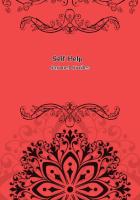The truth is Royalism sees itself verging towards sad extremities; nearer and nearer daily. From over the Rhine it comes asserted that the King in his Tuileries is not free: this the poor King may contradict, with the official mouth, but in his heart feels often to be undeniable. Civil Constitution of the Clergy; Decree of ejectment against Dissidents from it: not even to this latter, though almost his conscience rebels, can he say 'Nay; but, after two months' hesitating, signs this also. It was on January 21st,' of this 1790, that he signed it; to the sorrow of his poor heart yet, on another Twenty-first of January! Whereby come Dissident ejected Priests; unconquerable Martyrs according to some, incurable chicaning Traitors according to others. And so there has arrived what we once foreshadowed: with Religion, or with the Cant and Echo of Religion, all France is rent asunder in a new rupture of continuity; complicating, embittering all the older;--to be cured only, by stern surgery, in La Vendee!
Unhappy Royalty, unhappy Majesty, Hereditary (Representative), Representant Hereditaire, or however they can name him; of whom much is expected, to whom little is given! Blue National Guards encircle that Tuileries; a Lafayette, thin constitutional Pedant; clear, thin, inflexible, as water, turned to thin ice; whom no Queen's heart can love. National Assembly, its pavilion spread where we know, sits near by, keeping continual hubbub.
From without nothing but Nanci Revolts, sack of Castries Hotels, riots and seditions; riots, North and South, at Aix, at Douai, at Befort, Usez, Perpignan, at Nismes, and that incurable Avignon of the Pope's: a continual crackling and sputtering of riots from the whole face of France;--testifying how electric it grows. Add only the hard winter, the famished strikes of operatives; that continual running-bass of Scarcity, ground-tone and basis of all other Discords!
The plan of Royalty, so far as it can be said to have any fixed plan, is still, as ever, that of flying towards the frontiers. In very truth, the only plan of the smallest promise for it! Fly to Bouille; bristle yourself round with cannon, served by your 'forty-thousand undebauched Germans:' summon the National Assembly to follow you, summon what of it is Royalist, Constitutional, gainable by money; dissolve the rest, by grapeshot if need be. Let Jacobinism and Revolt, with one wild wail, fly into Infinite Space; driven by grapeshot. Thunder over France with the cannon's mouth; commanding, not entreating, that this riot cease. And then to rule afterwards with utmost possible Constitutionality; doing justice, loving mercy; being Shepherd of this indigent People, not Shearer merely, and Shepherd's-similitude! All this, if ye dare. If ye dare not, then in Heaven's name go to sleep: other handsome alternative seems none.
Nay, it were perhaps possible; with a man to do it. For if such inexpressible whirlpool of Babylonish confusions (which our Era is) cannot be stilled by man, but only by Time and men, a man may moderate its paroxysms, may balance and sway, and keep himself unswallowed on the top of it,--as several men and Kings in these days do. Much is possible for a man; men will obey a man that kens and cans, and name him reverently their Ken-ning or King. Did not Charlemagne rule? Consider too whether he had smooth times of it; hanging 'thirty-thousand Saxons over the Weser-Bridge,' at one dread swoop! So likewise, who knows but, in this same distracted fanatic France, the right man may verily exist? An olive-complexioned taciturn man; for the present, Lieutenant in the Artillery-service, who once sat studying Mathematics at Brienne? The same who walked in the morning to correct proof-sheets at Dole, and enjoyed a frugal breakfast with M. Joly? Such a one is gone, whither also famed General Paoli his friend is gone, in these very days, to see old scenes in native Corsica, and what Democratic good can be done there.
Royalty never executes the evasion-plan, yet never abandons it; living in variable hope; undecisive, till fortune shall decide. In utmost secresy, a brisk Correspondence goes on with Bouille; there is also a plot, which emerges more than once, for carrying the King to Rouen: (See Hist. Parl. vii. 316; Bertrand-Moleville, &c.) plot after plot, emerging and submerging, like 'ignes fatui in foul weather, which lead no whither.
About 'ten o'clock at night,' the Hereditary Representative, in partie quarree, with the Queen, with Brother Monsieur, and Madame, sits playing 'wisk,' or whist. Usher Campan enters mysteriously, with a message he only half comprehends: How a certain Compte d'Inisdal waits anxious in the outer antechamber; National Colonel, Captain of the watch for this night, is gained over; post-horses ready all the way; party of Noblesse sitting armed, determined; will His Majesty, before midnight, consent to go?
Profound silence; Campan waiting with upturned ear. "Did your Majesty hear what Campan said?" asks the Queen. "Yes, I heard," answers Majesty, and plays on. "'Twas a pretty couplet, that of Campan's," hints Monsieur, who at times showed a pleasant wit: Majesty, still unresponsive, plays wisk.
"After all, one must say something to Campan," remarks the Queen. "Tell M. d'Inisdal," said the King, and the Queen puts an emphasis on it, "that the King cannot consent to be forced away."--"I see!" said d'Inisdal, whisking round, peaking himself into flame of irritancy: "we have the risk; we are to have all the blame if it fail," (Campan, ii. 105.)--and vanishes, he and his plot, as will-o'-wisps do. The Queen sat till far in the night, packing jewels: but it came to nothing; in that peaked frame of irritancy the Will-o'-wisp had gone out.















